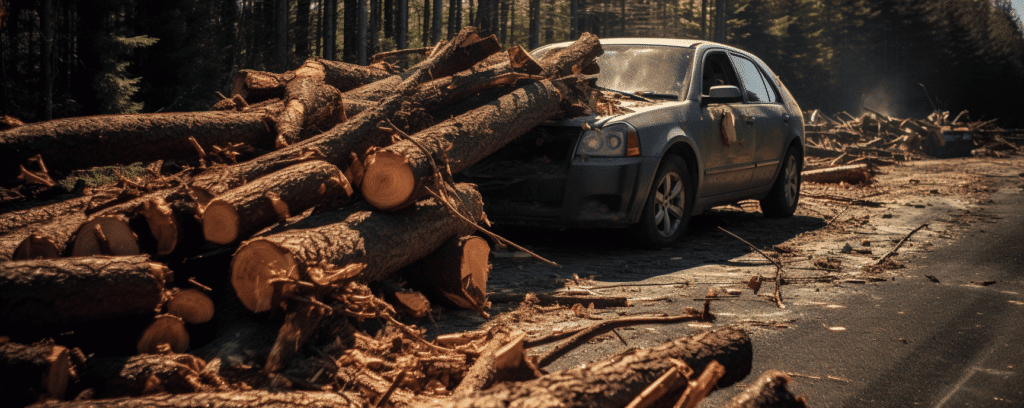Lumber Truck Accident
Last updated Monday, November 18th, 2024

Were you injured in a logging truck accident in Connecticut that was not your fault? You may be entitled to seek compensation for your medical bills, lost wages, and other expenses from the party responsible for the crash. A team of Experienced logging accident attorneys can help!

Get Your FREE Case Review,
In Person or Virtually Online
Logging trucks are large, heavy vehicles. When they collide with smaller passenger cars, the results are often devastating. You should not be left to struggle with the consequences of an accident that was not your fault. The Connecticut logging truck accident lawyers at Wocl Leydon stand ready to pursue the total financial relief you deserve.
For nearly three decades, our firm has helped injury victims across Connecticut rebuild their lives after devastating accidents. We work tirelessly to provide effective, compassionate representation to every client as we demand accountability from those who injured them. Our success is reflected in our many awards and the tens of millions of dollars we have secured in settlements and verdicts for our clients.
Let us take on the people responsible for your injuries and demand the money you deserve. Reach out to our lumber truck accident lawyers in Connecticut today for a free initial case review.
Types of Logging Truck Accidents in Connecticut
Some of the most common types of logging truck accidents include the following:
- Rollover accidents – Improperly balanced or unsecured logs can shift during travel, causing a logging truck to tip over onto its side, spilling cargo on the road.
- Jackknife accidents – An articulated truck “jackknifes” when its trailer swings out and forward toward the cab, causing the vehicle to fold like a pocketknife. The swinging trailer can strike nearby cars, and the momentum can cause the truck driver to lose control of the vehicle.
- Rear-end accidents – Because logging trucks carry heavy cargo, they can easily cause rear-end accidents if they follow other vehicles too closely. Large trucks need sufficient room to slow down and come to a complete stop. Tailgating can prevent a truck driver from avoiding a collision.
- Cargo accidents – Cargo accidents may occur when logs or other materials are unsecured and fall off the truck, striking nearby vehicles or blocking the road.
Common Causes of Log Truck Accidents

- Driver fatigue
- Speeding or driving too fast for conditions
- Improperly loaded cargo
- Driving while under the influence of alcohol or drugs
- Failure to use reflective tape and warning signs
- Inexperienced or improperly trained drivers
- Over-length or overweight trucks
- Distracted driving, such as using a cell phone behind the wheel
- Inadequate vehicle maintenance, including failing to maintain tires and brakes or use log-securing equipment

Get Your FREE Case Review,
In Person or Virtually Online
Common Injuries Due to Logging Truck Accidents
Injuries from logging truck accidents are often severe due to the size and weight of these vehicles and the cargo they carry. Common injuries that victims of these accidents suffer include:
- Lacerations and bruises
- Crush injuries
- Fractured bones
- Ligament sprains and tears
- Tendon and muscle strains and tears
- Internal organ injuries and internal bleeding
- Neck and back injuries
- Nerve damage
- Herniated disc injuries
- Spinal cord injuries and paralysis
- Head and facial injuries, including eye injuries
- Traumatic brain injuries (TBI)
- Traumatic amputation or loss of limb
Log Truck Driver Requirements
Under Connecticut law, log truck drivers must obtain a Class A commercial driver’s license to operate a log truck in the state. In addition, log trucks must follow all size and weight limits, including:
- Log trailers may not exceed 48 feet in length, including load.
- Trucks must not exceed 102.37 inches in width and 13.5 feet in height, including load.
- Trucks must have a gross vehicle weight rating not exceeding 80,000 pounds on five-axle vehicles, with no more than 51 feet between the first and last axle.
- Axles spaced less than six feet cannot bear more than 18,000 pounds per axle, while axles spaced six feet or more cannot carry more than 22,400 pounds per axle.
Log trucks exceeding the size and weight limits under state law must obtain an oversize or overweight load permit from the Connecticut Department of Transportation.
Evidence for Your Log Truck Accident Claim
At Wocl Leydon, we are prepared to thoroughly investigate the accident that injured you to gather valuable evidence to determine who is liable for your injuries and other losses. Examples of evidence that we might use in your log truck accident claim include the following:
- The truck driver’s hours-of-service (HOS) logs showing how long the driver had been on duty and behind the wheel before the accident
- The truck driver’s drug or alcohol screen results, if a test is performed following an accident
- The truck’s event data recorder or computer logs and GPS records
- The load manifest
- Dispatch records
- The truck driver’s cell phone records
- The truck’s inspection and maintenance records
- Police accident reports
- Surveillance or traffic camera footage
- Dashcam or in-cab footage
- Eyewitness testimony
- Accident reconstruction expert reports
Who Is Liable for Logging Truck Accidents in Connecticut?

- The truck driver – The truck driver may be liable if their actions caused the accident that led to your injuries.
- The trucking company – Trucking companies may be liable for the actions of the truck drivers they employ. They can also be liable if they fail to properly hire, train, or supervise drivers or if they fail to maintain vehicles and equipment.
- The logging company – Logging companies might be liable if they improperly load logs onto the truck or fail to secure the logs.
- The truck’s mechanic – Mechanics and maintenance crews that service the truck may be liable for an accident caused by a mechanical failure or another defect they failed to fix.
- The truck’s manufacturer or manufacturers of truck parts and equipment – Manufacturers may be liable for logging truck accidents caused by a defective truck or equipment.
Contact Our Experienced Connecticut Logging Truck Accident Lawyers Today
If you were injured in a Connecticut logging truck accident, the attorneys at Wocl Leydon want to help you pursue the compensation you deserve. Contact our experienced Connecticut logging truck accident lawyers today to discuss your case during a free initial consultation.

